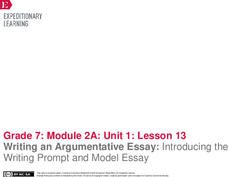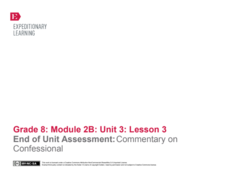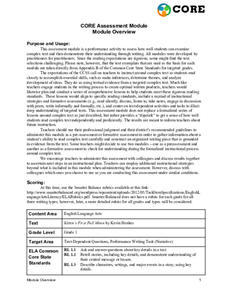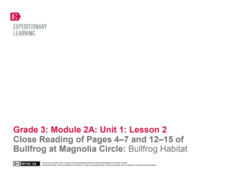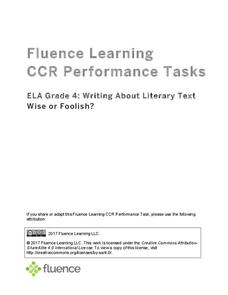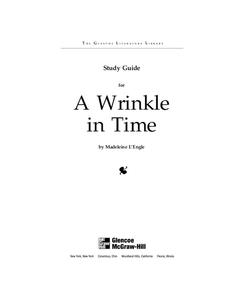EngageNY
Revising the Informative Consumer Guide: Sentence Structure, Transitions, and Works Cited
Transitions are the glue that link paragraphs together. Pupils listen to a mini lesson plan on sentence structure and transitions and use what they learned to revise their informative consumer guides. Next, they self-assess their writing...
EngageNY
Mid-Unit Assessment and Establishing a Context for My Hero’s Journey Narrative
How do writers engage their readers in a story? Pupils consider the question and use the informational text, "The Hero's Journey" to justify their plan for their own fictional narrative. To that end, scholars write an explanatory...
EngageNY
Writing an Argumentative Essay: Introducing the Writing Prompt and Model Essay
Pupils begin the writing process in preparation for an end-of-unit essay based on Katherine Paterson's Lyddie. To get started, they read and discuss a model essay and learn about the similarities and differences between argumentative and...
EngageNY
End of Unit 2 Assessment, Part 1b: Writing Introduction and Conclusion
Writers continue looking at the rubric for their A Long Walk to Water essays. This time, they analyze the demands for the introduction and conclusion paragraphs. Pupils compare the rubric to the opening and closing of the model essay,...
EngageNY
End of Unit Assessment: Commentary on Confessional
What does commentary have to do with narrative? Before scholars explain the narrative choices in their Character Confessionals, they review provided commentary to explain the score they received on previous assessments. They review...
California Education Partners
Follow the Water by Arthur Dorros
Assess scholars' reading and writing capabilities with an exam that challenges learners to respond to an informative text. Through note-taking and peer discussion, pupils analyze a passage from the story, Follow the Water from Brook to...
California Education Partners
Covers by Nikki Giovanni
Over three days, scholars listen to and read the poem, "Covers" by Nikki Giovanni. Learners complete a graphic organizer by sketching their visualizations from each stanza then discuss their pictures with a peer. Pupils answer...
California Education Partners
Kitten's First Full Moon by Kevin Henkes
A 3-day exam assesses readers' comprehension. After hearing a passage from the story Kittens First Full Moon by Kevin Henkes, scholars work with a partner to discuss and sketch what they found memorable. Peers share their final products...
California Education Partners
We Are The Ship
An assessment sheds light on scholars' ability to read, gather evidence, and draft an original written composition. Learners read an informative text twice before taking notes and discussing their thoughts and textual evidence with a...
California Education Partners
Telescopes
An assessment challenges scholars to read an informative text then respond with an explanatory essay. The exam begins as participants read a text passage twice then take notes, making sure to jot down key details. Following the...
California Education Partners
Seeing Eye to Eye
A performance task challenges scholars to read an informational text then respond with an explanatory essay. The exam begins with an independent reading of Seeing Eye to Eye by Leslie Hall. A second reading follows with the completion of...
EngageNY
Close Reading of Pages 4 - 7 and 12 - 15 of Bullfrog at Magnolia Circle: Bullfrog Circle
Scholars take part in a close reading of pages four through seven and 12-15 of the book, Bullfrog at Magnolia Circle: Bullfrog Circle by Deborah Dennard. Readers identify the story's main idea, list its key details, and examine...
Literacy Design Collaborative
Elie Wiesel's Acceptance Speech Analysis
Elie Wiesel's Nobel Prize Acceptance speech provides young historians with an opportunity to demonstrate their ability to use evidence from the speech. They work together to analyze how Wiesel uses rhetorical devices and syntax to...
College Board
Calculations Aren't Enough!
Unlike mathematics, statistics comes with a context. The author reminds teachers that data analysis involves using the context to make sense of the numbers. The article stresses good communication skills by highlighting the scoring...
College Board
Teaching Students How to Write AP Statistics Exam Responses
But this is math—we don't need to know how to write! The article makes a point that class members in AP® Statistics should be comfortable writing as the exams require it. Individuals quickly realize that quality writing is crucial to a...
The New York Times
Writing to Explain: Creating How-To Scripts and Demonstrations
Excuse me, can you give me directions? Scholars examine and practice technical writing to increase their ability to write directions. They participate in discussion, watch videos, and complete an assignment to create their own directions.
Teach It Primary
What Letter Will You Write?
After reading "The Pied Piper of Hamelin," scholars discuss the emotions the events provoked in its characters. In pairs, writers compose a letter depending on the topic and style of their choice then reply to their own or a peer's...
Birmingham City Schools
Stick to the Point: Getting It Right with Constructed Responses
Practice writing constructed responses with a 26-slide presentation. Developed to guide scholars through the appropriate steps, the resource assists them in providing a well-considered answer.
Fluence Learning
Writing About Literature: Comparing and Contrasting Characters in Heidi
Scholars read excerpts from the story, Heidi, in a three-part assessment that focuses on comparing and contrasting characters. Each part contains three tasks that challenge learners to discuss, answer comprehension questions,...
Fluence Learning
Writing About Literary Text: Wise or Foolish?
A three-part assessment promotes reading comprehension skills. Class members read literary texts and take notes to discuss their findings, answer comprehension questions, write summaries, and complete charts.
Roald Dahl
The Twits - Muggle-Wump Has an Idea
If a bar of chocolate was on the floor, would you try to pick it up? What if it was covered with glue? The eighth lesson plan in an 11-part unit designed to accompany The Twits by Roald Dahl has scholars imagine crazy scenarios. The...
McGraw Hill
Study Guide for A Wrinkle in Time
Mrs. Who, Mrs. Whatsit, and Mrs. Which would not be so confused if they had a study guide as great as this. Scholars increase their comprehension of A Wrinkle In Time through many supports such as guided questions, background...
McGraw Hill
Study Guide for Tuck Everlasting
Tuck Everlasting by Natalie Babbitt is a classic novel that readers have enjoyed for years. Resources within the study guide such as discussion and guided reading questions, extension activities, and graphic organizers aid comprehension...
Fluence Learning
Writing About Informational Text: The Dred Scott Decision
Looking for a performance assessment that asks individuals to demonstrate their competency in writing about informational text? Use Frederick Douglass' essay "On the Dred Scott Decision," and an excerpt from Abraham Lincoln's 1857 speech...




